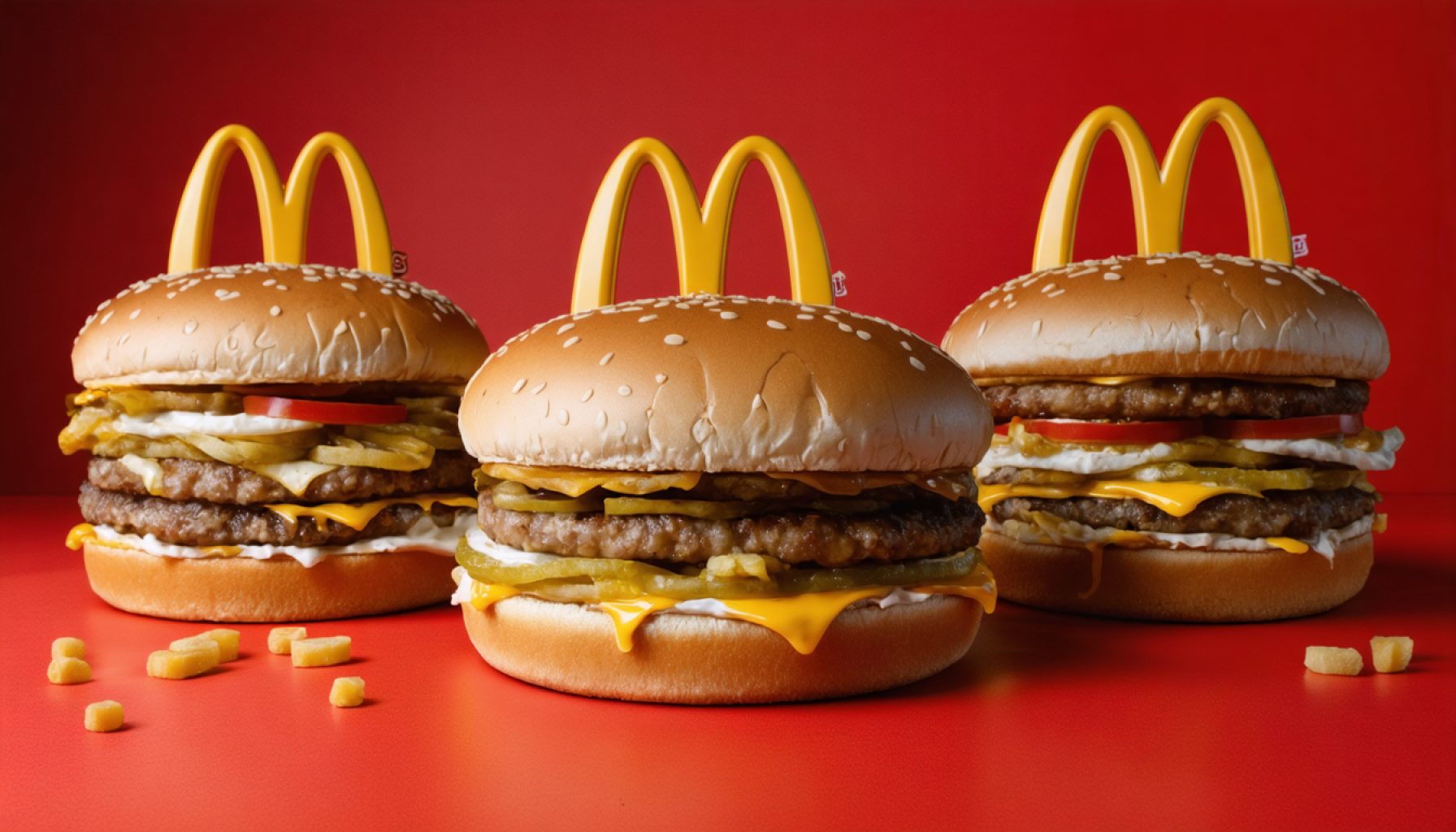- Amidst market volatility, McDonald’s Corporation (NYSE:MCD) emerges as a stable investment choice.
- Despite economic challenges like inflation, McDonald’s stock price rose by 2%, reflecting its resilience.
- Jim Cramer praises McDonald’s as a protective investment against financial instability and market chaos.
- The fast-food giant’s simple, efficient business model appeals to investors as a safe haven.
- McDonald’s adaptability across diverse markets highlights its robust capability during economic downturns.
- While AI and tech stocks capture interest for high returns, McDonald’s offers steady, secure investment potential.
- In the fast-paced era of innovation, McDonald’s provides a conservative, reliable option for safeguarding capital.
As traders wrestle with the tumultuous winds of market upheaval, a glimmer of stability emerges from an unlikely hero clad in golden arches. McDonald’s Corporation (NYSE:MCD), the colossal titan of the fast-food industry, becomes a beacon of reliability. Investors are seeking refuge amid looming economic storms, with McDonald’s serving up not just Big Macs, but solace in an otherwise volatile financial landscape.
Picture the bustling fast-food kitchens preparing for the daily rush—a scene that encapsulates the enduring appeal of McDonald’s. Despite inflation pinching the wallets of consumers, the allure of an affordable meal seems unwavering. As economic tremors left the marketplace reeling and equities took a nosedive, McDonald’s defied gravity; its stock price charmingly rose by 2%, a testament to its steadfast nature.
Jim Cramer, the vocal market guru on CNBC’s “Squawk on the Street,” punctuated this point with fervor. In an era where tariffs cloud future predictions and supply chains morph into complex mazes, Cramer brands McDonald’s as a sanctuary—a defense against the encroaching financial chaos. “Buy a McDonald’s,” he rallies, urging investors to seek shelter from storms in the unassuming banner of cheap cheeseburgers and fries.
While hedge fund whispers and quarterly returns dominate financial discourse, it’s the enduring simplicity of McDonald’s business model that beckons investors toward safety. Restaurants continue to churn out meals with robotic efficiency, adapting effortlessly from the bustling streets of Tokyo to the sun-drenched avenues of Los Angeles. This adaptability underscores a crucial advantage during economic turbulence: resilience.
Yet, in the electric air ridden with the buzzwords of artificial intelligence and cutting-edge tech, some may argue that the next gold rush lies within advanced innovations. Investors eyeing swift returns survey AI stocks with ravenous interest, eager for the promise of high yields. Certain burgeoning tech firms even tease investors with stocks valued at less than five times earnings, offering tantalizing potential.
However, in the face of digital evolution and tech-driven futures, McDonald’s carves out a conservative path for those yearning for the familiar embrace of a stable investment. Its potential may not promise astronomical leaps or groundbreaking innovation, but it safeguards capital—a feature increasingly rare in today’s finance frontier.
And so, in the orchestra of market speculation where AI crafts new symphonies, alongside sprawling strategies and daring ventures, McDonald’s stands as the cello. Its steady, comforting notes offer a balancing cadence, reminding investors that in the search for safety and security, sometimes the simplest choice is the most formidable one.
Why McDonald’s Offers Stability Amid Financial Chaos
The Resilient Appeal of McDonald’s: A Safe Haven for Investors
McDonald’s Corporation has emerged as an unexpected bastion of stability in economically tumultuous times, drawing in investors seeking reliable returns. Its appeal lies not just in its comforting fast food offerings, but in a business model that thrives even when markets reel from unpredictability.
Why McDonald’s Survives Economic Storms
1. Consistent Global Presence: McDonald’s operates over 38,000 locations in more than 100 countries. This global footprint means the company can maintain revenue even if one region experiences economic downturns.
2. Affordable Offerings: In times of financial hardship, consumers prioritize affordability, making McDonald’s value meals attractive. Affordable dining options have always secured a steady flow of customers, cushioning against drastic revenue drops.
3. Operational Efficiency: McDonald’s leverages state-of-the-art technology to optimize kitchen operations, keeping service swift and efficient. This is essential in maintaining customer satisfaction and encouraging repeat visits.
4. Brand Loyalty and Recognition: Decades of consistent branding nestle McDonald’s into the public psyche, assuring consumers of familiarity wherever they travel.
Real-World Use Cases and Investor Insights
Market Forecasts & Trends:
The fast-food industry is projected to continue growing, with an expected CAGR of 4.6% from 2023 to 2030 (source: Business Research Insights). McDonald’s steady adaptations to market needs—such as healthier menu options and digital transformation—position it well to capitalize on these trends.
Security & Sustainability:
McDonald’s commitment to sustainable farming, recyclable packaging, and reducing greenhouse gas emissions has improved its ESG (Environmental, Social, and Governance) profile, increasingly important to modern investors.
How-To: Safeguard Investments with McDonald’s
– Diversify Portfolios: Use McDonald’s stock as a stabilizer within a diversified investment portfolio that includes both high growth and solid, traditional stocks.
– Regularly Review Financial Health: Keep an eye on McDonald’s quarterly earnings, same-store sales growth, and global economic indicators to anticipate potential impacts on its stock performance.
Where McDonald’s Stands Compared to Tech Stocks
Pros and Cons Overview:
– Pros: Stability, global reach, proven track record, ESG initiatives.
– Cons: Limited rapid growth potential compared to tech innovations, potentially less appeal to investors focused exclusively on high-return sectors.
Potential Risks and Market Positioning
Despite McDonald’s solid position, it faces challenges such as fluctuating commodity prices, changing consumer tastes towards healthier options, and fierce competition from emerging fast-casual dining chains.
Actionable Recommendations
– Consider Long-term Investments: McDonald’s is best suited for investors with a long-term strategy who value steady dividends and lower volatility.
– Monitor Industry Trends: Stay informed on the fast-food industry’s adaptations to health trends, tech, and consumer preferences to anticipate potential shifts in McDonald’s growth strategy.
For more insights into McDonald’s strategies and financial health, explore McDonald’s Corporate.
